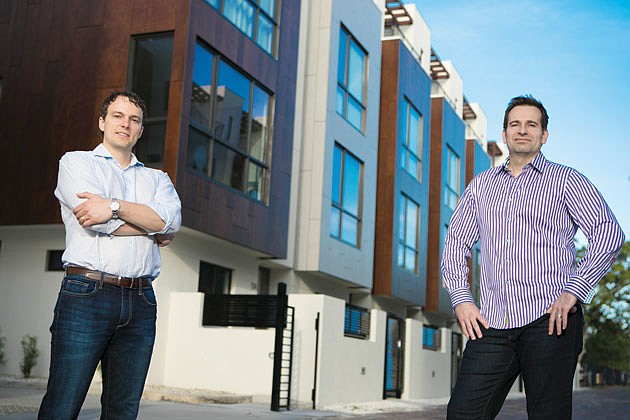- November 24, 2024
-
-
Loading

Loading

By John Haughey | Contributing Writer
With one downtown St. Petersburg townhouse development sold out, and units in two more selling briskly in anticipation of being occupied by early 2019, Tampa-based Icon Residential may need to tweak its marketing strategy to target an unexpected clientele.
The new niche target: people with problematic marriages.
“The only demographic we didn't foresee is the ton of divorcees,” Icon Residential Principal Mike Bednarski says. “Divorced empty-nesters are selling their homes in the suburbs and moving into walkable communities. They may not be able to afford a luxury condo, so this is their next step.”
“We anticipated getting a lot of millennials and ended up with empty-nesters,” Icon Planning Director Brian Kiraly adds.
That's fine with them. The bottom line is Icon's strategy in building boutique-style townhouse developments that embrace New Urbanist design principles in revitalized downtowns is paying off in St. Petersburg. The 8-year-old company, which generated about $65 million in revenue in 2016, employs about 50 people in offices in Tampa, Atlanta and New York.
Bednarski says “there is more demand than the market is providing” in downtown St. Petersburg for townhouses priced between $300,000 and $515,000 that are also low-maintenance and within 5-10 minute walks of shopping, recreational amenities, nightlife and jobs.
In addition to location and moderate pricing, Kiraly says another draw for Icon's townhouses is they are “fee-simple townhouses, not condominiums or apartments. The response has proven there is a demand for that.”
Icon's developments are The Arlington St. Pete, a 40-unit, one-acre complex on Eighth Street North along Arlington Avenue North; The District on 9th, a 34-unit, four-story structure on one acre on the corner of Ninth Street North and Arlington North; and Uptown Kenwood, a 69-unit, three-story, three-acre community on 13th Avenue North.
Bednarski says The Arlington is sold out and occupied while construction on The District on 9th and Uptown Kenwood is underway. “We're selling units as we speak,” he says.
Bednarski says Icon's projects are “catalysts for the area” and part of a dynamic wave of development revitalizing downtown St. Petersburg since 2013. The townhouses are within walking distance of downtown's EDGE (Entertaining, Dining, Galleries & Shops, Etc.) District, which is flourishing with an eclectic array of newly opened sushi bars, coffee shops, restaurants, craft beer pubs, dance clubs, art galleries and office complexes.
Innovative development spurs innovative development, Bednarski says. “Amenity proliferation: That's why we wanted to build there,” he says.
Icon was founded in 2009, a partnership between Bednarski and two fellow principals — Peggy Tseung, a former investment banking analyst at JPMorgan Chase and Ryan Studzinski, an institutional broker who has developed more than $250 million in real estate in the Tampa Bay area.
In 2012, the trio established Broome Capital, a real estate development company with three subsidiaries that specialize in providing financing for distressed housing, urban development and infill self-storage investment entities. Icon has since added IGC Builders, its own general contractor firm, and Crestview Realty Group, to its in-house capacities to become “a full turn-key operation,” Bednarski says.
Icon's first urban infill project was the Valencia at Rosemary Place in downtown Sarasota. It has since built — or is building — 13 developments, including projects in Tampa, Orlando and Atlanta and the three in St. Petersburg. Kiraly says Icon is looking to expand to Charlotte, N.C.
Bednarski says “the next wave of gentrification we're looking at” includes possible sites in Tampa Heights, Seminole Heights, South Tampa and Sarasota's Rosemary District. He says only 5% of sites the company looks at meet Icon's criteria — a five- to 10-minute walk from nightlife, retail and employment. “The difficulty is finding sites that work,” Kiraly says. “We wouldn't do something like this in Pasco County.”
Since first proposing an urban infill project that “had people scratching their heads,” Bednarski has learned some valuable lessons in the niche.
“The barriers to entry are very high,” for one, he says. Prospective developers must have the financial resources and professional capacity to handle as much as possible in-house.
By evolving into a “vertically integrated” company with the inclusion of subsidiaries such as Broome Capital and Crestview Realty, he says, Icon can get things done faster and less expensively. “We now have enough scale to be our own general contractor,” Bednarski says.